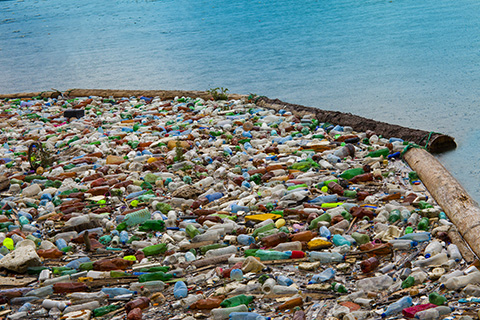A recent report by WWF reveals that the cost of plastic in low-income countries is 10 times higher than in more developed countries, despite the fact that they consume less plastic per capita.
This alarming figure highlights the existing inequalities in terms of the environmental and economic effects generated by this problem. The unequal use of plastic has significant consequences for low- and middle-income countries, such as Kenya, where international negotiations are underway to combat plastic pollution. Six years ago, Kenya took a bold step by banning single-use plastic bags. However, the country continues to fight against the illegal importation of these bags. This is evidence of the cross-border nature of the problem and the serious inequalities associated with the current plastics value chain.
Current plastic system
The current system of production, use and disposal of plastics is designed in a way that affects the most vulnerable countries on the planet the most. Instead of solving the global plastic pollution crisis, the system shifts much of the costs to those who are least equipped to manage them, without holding the main producers and users of these products accountable. This approach creates class inequalities, not only in the environmental sphere but also in health risk and exposure to toxic chemicals, as well as in the increased danger of flooding and disease.

WWF International’s Director of Policy, Influence and Engagement, Alice Ruhweza, warns of the need for an immediate overhaul of the current plastics system. Continuing on the current path could lead to a death sentence, both for wildlife and for the most vulnerable and marginalized communities around the world. The report highlights the opportunity presented by the negotiation of the global treaty on plastic pollution, citing the importance of establishing binding and equitable global rules on production and consumption.
This article aims to encourage reflection on the unequal access to resources for dealing with plastic pollution and to promote active engagement to find equitable solutions to this problem. Environmental protection should be a global concern, regardless of socioeconomic conditions.
Contribute to the care of the environment
In a world where the cost of plastic is 10 times higher in poor countries, there is a clear need to take concrete actions to address environmental issues. One of the most effective ways to drive positive change is through education and specialized training. For this reason, the Universidad Internacional Iberoamericana (International Iberoamerican University, UNIB) offers the Master in Environmental Management and Audits; a program that guides students towards solid knowledge and practical skills to face today’s environmental challenges. Through advanced courses and innovative learning techniques. Students will gain an in-depth understanding of current trends in environmental management and will be prepared to address emerging challenges in the field of sustainability.
The ability to assess and verify the environmental impacts of human activities is essential for developing effective strategies for managing and reducing environmental damage.
Source: Cost of plastic is 10 times higher in poor countries than in rich countries

